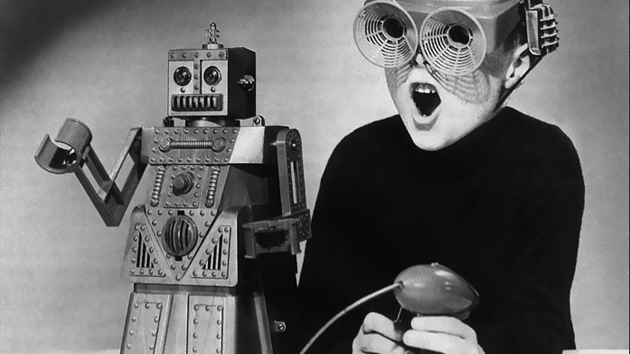
27 Jun What Marc Andreessen Gets Wrong About Our Future Robot Overlords
Tasneem Raja, Mother Jones Interactive Editor, writes about alternative scenarios to mega-venture-capitalist Marc Andreesen’s vision of the future; one that he says will be a robotic utopia of leisure.
Marc Andreessen recently wrote a widely shared post about how robots will change the economy. The Netscape founder turned mega-venture-capitalist predicts that we’re headed toward a future when robots do our grunt work, launching a “Golden Age” where humans are freed from wage-grubbing to do “nothing but arts and sciences, culture and exploring and learning”:
Housing, energy, health care, food, and transportation — they’re all delivered to everyone for free by machines. Zero jobs in those fields remain…It’s a consumer utopia. Everyone enjoys a standard of living that kings and popes could have only dreamed of…Since our basic needs are taken care of, all human time, labor, energy, ambition, and goals reorient to the intangibles: the big questions, the deep needs. Human nature expresses itself fully, for the first time in history. Without physical need constraints, we will be whoever we want to be.
Andreessen is not the first to daydream about this scenario. My colleague Kevin Drum has written about it extensively, and he shares some of Andreessen’s optimism about what this world might look like:
Global warming is a problem of the past because computers have figured out how to generate limitless amounts of green energy and intelligent robots have tirelessly built the infrastructure to deliver it to our homes. No one needs to work anymore. Robots can do everything humans can do, and they do it uncomplainingly, 24 hours a day. Some things remain scarce—beachfront property in Malibu, original Rembrandts—but thanks to super-efficient use of natural resources and massive recycling, scarcity of ordinary consumer goods is a thing of the past. Our days are spent however we please, perhaps in study, perhaps playing video games. It’s up to us.
Basically, it’ll be pretty sweet. But both Andreessen and Drum caution that this consumer utopia is at least several decades away, and getting there will be a bumpy ride until we come up with new ways for people to get the things they want and need. Because unlike the original Luddites, the British artisan weavers who protested the Industrial Revolution by ransacking garment mills, only to find new work running the machines, huge swaths of today’s workforce aren’t wrong to suspect a dead end ahead. “The Digital Revolution is different,” Drum says, “because computers can perform cognitive tasks too, and that means machines will eventually be able to run themselves. When that happens, they won’t just put individuals out of work temporarily. Entire classes of workers will be out of work permanently.” Which means many of us are headed for Hooverville 2.0, a possibility that Andreessen doesn’t disagree with, at least in the short term.
So how best to brace ourselves for that hiccup on the road to utopia? Here’s where Drum and Andreessen part ways.



Sorry, the comment form is closed at this time.